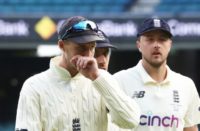AS Oscar Wilde’s Lady Bracknell said in The Importance Of Being Earnest: “To lose one parent may be regarded as a misfortune; to lose both looks like carelessness.”
What might she have said about the case of Peter Moores, who somehow managed to mislay three England cap- tains in six months?
Moores, appointed last week as the successor to Andy Flower as England’s new head coach, admits he made mistakes during his first stint and insists he has returned better for the experience of what he has achieved in the meantime at Lancashire, which is considerable, though not absolutely compelling.
And while sympathising strongly with the unlucky Ashley Giles we wish this irrepressible enthusiast nothing but good fortune in what is going to be a very tough job. But it would be remiss of us to move too quickly from past to future without exploring why it all went so wrong for him five years ago that the same ECB that has backed him now found they had no option but to get rid of him then.
It is well documented that things came to a head in dramatic fashion when, after the defeat to India at the end of 2008, they asked then captain Kevin Pietersen what he thought was needed to improve the fortunes of a team struggling to move forward from the high of the 2005 Ashes win and the low of losing them 5-0 in 2006-07 while dealing with the necessity of either replacing senior players or teaching some of those old dogs new tricks.
When he said “sack Moores” the ECB sacked both, but, far from being strike one and you’re out against the coach, when making their decision the powers-that-be also took into account the circumstances of the recent departure of Michael Vaughan, Pietersen’s predecessor as Test skipper and one-day captain Paul Collingwood.
Vaughan later revealed he thought he should have quit as captain on returning from the New Zealand trip in the spring of the same year because he and Moores did not see eye to eye on what needed to be done, how, and how quickly.
“I feel that Peter Moores had been a little bit disrespectful to the old regime,” Vaughan wrote in his end of tour report.
“He wants to change everything including personnel. I got the feeling he would like a young captain that he can control and brainwash.”
By the time Vaughan did resign six months later, after the Graeme Smith-dominated home series against South Africa had been lost with defeat in the third Test at Edgbaston, he had signalled his further misgivings when responding to the controversial call to select Darren Pattinson for his one and only England cap in the second Test at Headingley, ahead of Chris Tremlett.
Moores first appeared to blame Vaughan, saying the Yorkshireman had pushed for Pattinson on the grounds that he knew the local conditions required someone to bowl a fuller length. Vaughan replied testily that the controversial selection of someone who “didn’t know anyone and we didn’t know him” undermined team spirit and left them “a team divided” whereupon national selector Geoff Miller called a meeting with his captain to thrash out the issue which lasted two full hours.
For the detail of Collingwood’s resignation as one-day skipper, in his excellent book The Plan Steve James revealed: “That Collingwood went straight to (England Cricket managing director Hugh) Morris and did not even tell Moores speaks volumes about their relationship, or lack of it.
“It had stooped to its lowest level … when Moores forced Collingwood to apologise after a run-out incident involving New Zealand’s Grant Elliott at the Oval. Elliott had collided with Ryan Sidebottom as the bowler went for the ball and the spirit of the game suggested that Collingwood should have withdrawn his appeal. But he didn’t and there was an almighty rumpus. Moores then told Collingwood he should apologise. He did but he did not want to.”
Many may feel Moores was right to admonish him. But forcing him to apologise did little to appease those within the dressing room who held Moores’ lack of international experience against him or draw them closer together. Indeed, while their relationship may have hit rock bottom at this point, England players present at Napier in February that year would have been aware it would not have had that far to travel.
Reports differ as to exactly what Moores said to them at the end of an extraordinary ODI at McLean Park when, in exhausting heat, the Kiwis matched England’s massive 340 to earn a tie. Moores stressed later that his suggestion they should go back out for a fitness session, under Kiwi trainer Marques Church, was aimed mainly at those who had not been involved in the match itself and any others who felt like it.
Others, including Graeme Swann and Jimmy Anderson remember the event somewhat differently. According to Swann, in his book The Breaks Are Off, everyone was ordered to do the running.
“He (Moores) announced that the whole squad was to return to the field of play,” he wrote.
“‘The New Zealand boys will see us running on the square, and they will s*** their pants, because they’ll know that we mean business,’” Swann continued.
“S** their pants? More like p*** their pants… The Kiwi lads … sat there watching us from their dressing room balcony, beers in hand, laughing their heads off. It’s the most humiliating and degrading session I have ever been involved in.”
For his part, Moores stands by a lot of what he did first time round and good judges believe he is more than capable of living up to new England MD Paul Downton’s claim that he is “the leading English coach of his generation”.
They include Andy Flower, who Moores brought into the set-up, David Lloyd, Anderson, the most obvious beneficiary of Moores’ ruthlessness in promoting him and Stuart Board ahead of Steve Harmison and Matthew Hoggard and, fortunately for all concerned, captain Alastair Cook, an admirer of his approach.
“Energy cannot be saved, it can only be created,” is Moores’ philosophy and like so much of what he says, it has a ring to it, though if he says “controlling the controllables” one more time I will not be held responsible for my actions.
“Everyone deserves a second chance,” tweeted Pietersen on hearing of Moores’ job and Moores had the good grace to appreciate the joke, as he did not blab when it was taken away from him the first time.
But when considering the rate of the change he surely must implement, perhaps it might be just as useful for him to recall another well-known-phrase-or-saying: “Those who cannot learn from history are doomed to repeat it.”















